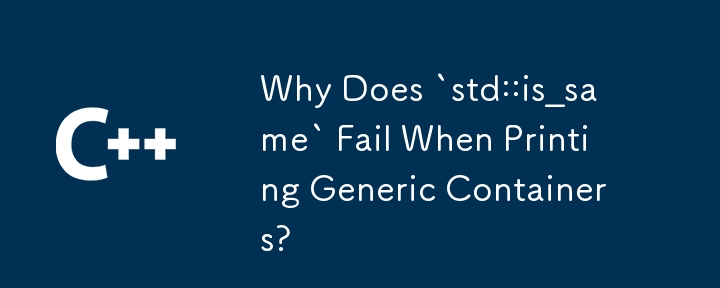

std::is_same for Generic Container Printing: Why It Fails and Solutions
You have encountered an issue when attempting to write a generic function to print both stack and queue containers. The function initially included a conditional statement to determine the type of container (stack or queue) and access its elements accordingly. However, this approach resulted in compilation errors due to the difference in member functions between the two container types.
Understanding the Issue:
The compilation error stems from the fact that a branch of the if-else statement attempts to access front() on a stack type and top() on a queue type. These accessors are not available on the respective types, causing the compiler to complain. C has strong typing, requiring that a specific type be provided with the corresponding member functions that it supports.
Resolving the Problem:
To resolve this issue, we need a solution that can differentiate between the container types while still providing access to their specific member functions. Here are two possible solutions:
1. Partial Specialization with Accessor:
One approach is to use partial template specialization and define an accessor function for each container type. This accessor function will retrieve the top or front element as needed.
<code class="cpp">template <typename Cont>
struct element_accessor;
template <typename T>
struct element_accessor<std::stack<T>> {
const T& operator()(const std::stack<T>& s) const { return s.top(); }
};
template <typename T>
struct element_accessor<std::queue<T>> {
const T& operator()(const std::queue<T>& q) const { return q.front(); }
};
template<typename Cont>
void print_container(Cont& cont){
while(!cont.empty()){
auto elem = element_accessor<Cont>{}(cont); // call the accessor function
std::cout << elem << '\n';
cont.pop();
}
}2. if constexpr with C 17:
If your development environment supports C 17, you can utilize the if constexpr statement, which performs compile-time evaluation and allows conditional execution based on the type of container.
<code class="cpp">template<template<class> typename Cont, typename T>
void print_container(Cont<T>& cont){
while(!cont.empty()){
if constexpr (std::is_same_v<Cont<T>, std::stack<T>>)
std::cout << cont.top() << '\n';
else if constexpr (std::is_same_v<Cont<T>, std::queue<T>>)
std::cout << cont.front() << '\n';
cont.pop();
}
}</code>Both solutions allow you to write a generic function that can print both stack and queue containers, effectively sharing code between search algorithms like DFS and BFS.
The above is the detailed content of Why Does `std::is_same` Fail When Printing Generic Containers?. For more information, please follow other related articles on the PHP Chinese website!




